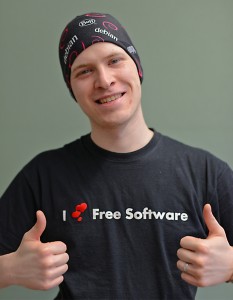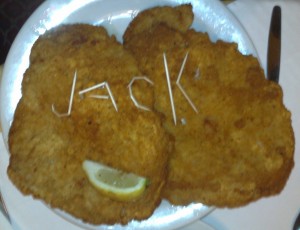Diejenigen, die der Titel dieses Eintrags an [1] erinnert, muss ich leider schon jetzt enttäuschen: Ich schreibe heute nicht über die Rettung der deutschen Sprache. Auch wenn ich sie liebe wie keine zweite, überlasse ich ihren Schutz lieber dem Zwiebelfisch (sollte irgendetwas in diesem Text nicht den Regeln meiner Muttersprache entsprechen, so bitte ich um Verzeihung und einen kurzen Hinweis, damit ich den Text bereinigen kann).
Worum geht es nun wirklich? Es geht um das Thema der Vorratsdatenspeicherung (engl. data retention). In Österreich soll demnächst eine vom EU-Parlament im Jahr 2005 beschlossene Richtlinie umgesetzt werden, die eine Speicherung einer Vielzahl an Verkehrsdaten aller Bürger vorschreibt. Die genauen Inhalte dieser Richtlinie wurden bereits ausgiebig an verschiedener Stelle diskutiert, weshalb ich hier nicht weiter darauf eingehen möchte (da ich kein Jurist bin, wäre das wohl auch wenig sinnvoll).
Vielmehr möchte ich – inspiriert von einem Artikel und einem Kommentar in der österreichischen Tageszeitung “Die Presse” – einige Probleme, die sich für mich persönlich aus dieser Thematik ergeben zu Papier – genauer gesagt zu Weblog – bringen.
Dass unsere Privatsphäre schützenswert ist, steht in Österreich im Allgemeinen Bürgerlichen Gesetzbuch (ABGB). Die EU scheint dies aber anders zu sehen, denn meiner bescheidenen Meinung nach ist die Speicherung von Daten, die darüber Auskunft geben, wann ich mit wem (u.U. auch wie lange) kommuniziert habe, ein schwerer Einbruch in selbige. Tatsächlich ist die Frage, ob die erwähnte EU-Richtlinie den Grundrechten der Bürger Europas widerspricht, noch gar nicht geklärt – weshalb ich es gut finde, dass diese Richtlinie in Österreich bisher nicht umgesetzt wurde. Das soll sich nun aber ändern. Das österreichische Infrastrukturministerium hatte – und das ist sehr löblich – das Ludwig-Boltzmann-Institut für Menschenrechte (BIM) damit beauftragt, einen entsprechenden Gesetzesentwurf zu erarbeiten. Die Begutachtungsfrist für diesen Entwurf ist kürzlich abgelaufen, und wie im weiter oben erwähnten Artikel in der “Presse” zu lesen ist, fordert nun das österreichische Justizministerium (mit Rückendeckung des Innenministeriums), dass auf die im Rahmen der “data retention” gespeicherten Daten auch in Fällen zugegriffen werden darf, die von der EU gar nicht vorgesehen sind – etwa auch bei Zivilrechtsverfahren, z.B. im Fall von “Raubkopierern”.
Abgesehen davon, dass Terroristen – und für deren Jagd wurde die Richtlinie eigentlich geschaffen – die Vorratsdatenspeicherung sehr leicht umgehen können, können Betreiber offener WLAN-Zugangspunkte unverhofft ins Visier von Ermittlungen kommen – genaugenommen stehen aber durch die Richtlinie ohnehin alle Bürger unter Generalverdacht. Dass zudem die Pressefreiheit und vor allem der Informantenschutz durch die Verkehrsdatenspeicherung in Gefahr sind, müsste ich an dieser Stelle wahrscheinlich gar nicht mehr erwähnen.
Die Frage, warum dieser Eintrag diesen etwas seltsam anmutenden Titel trägt, habe ich bisher nicht beantwortet, aber soll nun geschehen. Der Titel ist eine vereinfachte Formulierung meines laienhaften Verständnisses unseres Rechtssystems. Letzteres folgt meines Wissens nach einem Schema, dass dem folgenden recht ähnlich ist:
Beginge ich eine Verwaltungsübertretung (etwa zu schnelles Fahren oder Falschparken), würde ich dafür bestraft.
Beleidigte ich auf ungebührliche Weise eine andere Person, würde mich diese zivilrechtlich verklagen können.
Beginge ich ein schweres Verbrechen (etwa gegen Leib und Leben), würde ich verfolgt, angeklagt und verurteilt.
Sie werden jetzt vielleicht sehen, worauf ich hinaus will: Dieses “Würde” sollte auch in Zukunft unantastbar sein. Einen Unschuldigen zu verfolgen, nur weil er den Abschnitt “Sicherheit” in der Bedienungsanleitung seines Drahtlos-Netzwerkgeräts nicht gelesen hat, widerspricht diesem Schema aber zweifellos.
[1] Bastian Sick: Der Dativ ist dem Genitiv sein Tod, Folge 4: Das Allerneueste aus dem Irrgarten der deutschen Sprache. Kiepenheuer & Witsch, Köln 2009, S. 194-196, ISBN 978-3-462-04164-4

